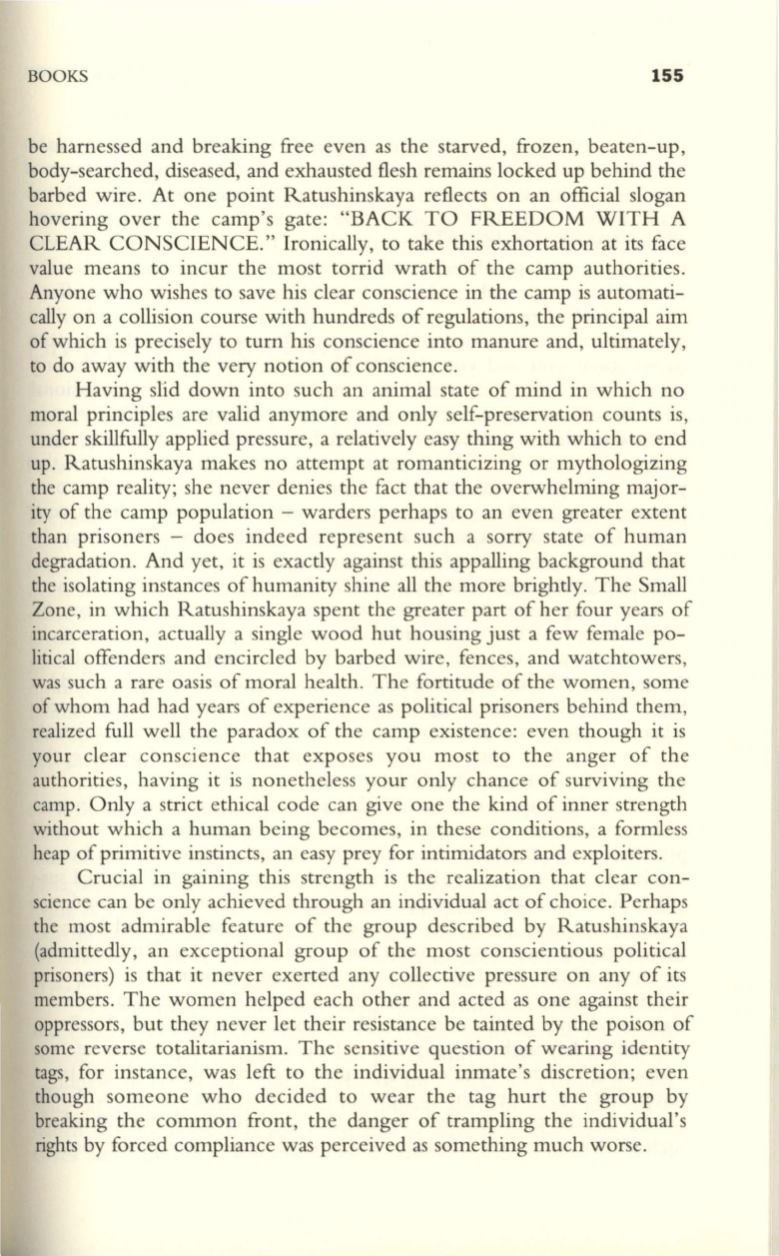
BOOKS
155
be harnessed and breaking free even as the starved, frozen, beaten-up,
body-searched, diseased, and exhausted flesh remains locked up behind the
barbed wire. At one point Ratushinskaya reflects on an official slogan
hovering over the camp's gate: "BACK TO FREEDOM WITH A
CLEAR CONSCIENCE." Ironically, to take this exhortation at its face
value means to incur the most torrid wrath of the camp authorities.
Anyone who wishes to save his clear conscience in the camp is automati–
cally on a collision course with hundreds of regulations, the principal aim
of which is precisely to turn his conscience into manure and, ultimately,
to do away with the very notion of conscience.
Having slid down into such an animal state of mind in which no
moral principles are valid anymore and only self-preservation counts is,
under skillfully applied pressure, a relatively easy thing with which to end
up. Ratushinskaya makes no attempt at romanticizing or mythologizing
the camp reality; she never denies the fact that the overwhelming major–
ity of the camp population - warders perhaps to an even greater extent
than prisoners - does indeed represent such a sorry state of human
degradation. And yet, it is exactly against this appalling background that
the isolating instances of humanity shine all the more brightly. The Small
Zone, in which Ratushinskaya spent the greater part of her four years of
incarceration, actually a single wood hut housing just a few female po–
litical offenders and encircled by barbed wire, fences, and watchtowers,
was such a rare oasis of moral health. The fortitude of the women, some
of whom had had years of experience as political prisoners behind them,
realized full well the paradox of the camp existence: even though it is
your clear conscience that exposes you most to the anger of the
authorities, having it is nonetheless your only chance of surviving the
camp. Only a strict ethical code can give one the kind of inner strength
without which a human being becomes, in these conditions, a formless
heap of primitive instincts, an easy prey for intimidators and exploiters.
Crucial in gaining this strength is the realization that clear con–
science can be only achieved through an individual act of choice. Perhaps
the most admirable feature of the group described by Ratushinskaya
(admittedly, an exceptional group of the most conscientious political
prisoners) is that it never exerted any collective pressure on any of its
members. The women helped each other and acted as one against their
oppressors, but they never let their resistance be tainted by the poison of
some reverse totalitarianism. The sensitive question of wearing identity
tags, for instance, was left
to
the individual inmate's discretion; even
though someone who decided to wear the tag hurt the group by
breaking the common front, the danger of trampling the individual's
rights by forced compliance was perceived as something much worse.


